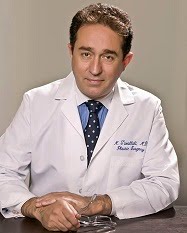The unfortunate case of Mrs. West's death following breast reduction and abdominoplasty by Dr. Jan Adams, in California has generated many questions and intense scrutiny in the Press and from Patients. As in many of these unfortunate types of cases, there are many lessons to be learnt and currently the Press is ignoring the truly important aspects that need to be discussed.
Let me make a disclaimer. I know Dr. Adams personally, as we were co-residents in General Surgery during five years of training at Lenox Hill Hospital in New York City. I have seen Dr. Adams operate and take care of his patients first hand- most plastic surgeons cannot make this claim with respect to their colleagues. Dr. Adams is a great surgeon- he is intelligent, educated, articulate, and exceptionally well trained as a plastic surgeon at some of the premier institutions in this country, and is technically gifted. (Many surgeons are fumblers-believe it or not!)
From what I can gather, Mrs. West was an equally intelligent, well informed middle aged women with minor medical conditions which many patients have and which would not exclude anyone from undergoing cosmetic surgery.
Complications can occur in any surgical procedure and though death is extremely rare, it is obviously what all patients and surgeons at least think about, however fleetingly, as a possibility at some point during the consultation, surgery set up period, during the surgery or in the post-operative period. It is the "unspeakable but not the mentionable" risk that exists with any surgical procedure. What the cause of Mrs. West's demise was, will hopefully be made clear after tests are done. One thing that is already clear to any surgeon is that Dr. Adams did not kill Mrs. West, as has been insinuated in the Press and TV.
The fact that Dr. Adams is not a board certified plastic surgeon does not have any relation to the case. He was trained as a plastic surgeon and has been practicing as one for over 15 years. MANY THOUSANDS OF PLASTIC SURGEONS ARE NOT BOARD CERTIFIED - BUT THEY ARE PLASTIC SURGEONS. There are numerous reasons why a plastic surgeon may not become board certified and almost all are due to politics within the Plastic surgery community, or personal reasons on the part of the surgeon. To think that a candidate for board certification in plastic surgery, after going through some of the most rigorous training offered in medicine and surgery, after having taken literally thousands of exams, and risen above his or her competitors during high school, college, medical school and residency training, should somehow not be performing plastic surgery is nonsense.
The real issue that we should be focusing on and for which a national discussion is long overdue is the fact that the majority of cosmetic surgery procedures in this country are performed by doctors who are not trained plastic surgeons, and in many cases, not even surgeons. There are about 450,000 doctors in this country and 60,000 doctors who perform cosmetic surgery- yet there are only 6000 plastic surgeons- and of those, only about 3000 are members of the American Society for Aesthetic Plastic Surgery- plastic surgeons who perform cosmetic surgery primarily.
The vast number of cosmetic surgeries are being performed by doctors who are untrained in plastic surgery. They may be board certified, but are board certified in disciplines other than plastic surgery. Plastic surgeons typically have trained for 6-8 years after medical school. They are dermatologists ( with a one month training as a junior resident on a surgical team as part of their 3 years of dermatology training), gynecologists / obstetricians (whose area of expertise is obviously limited to certain anatomical areas during their 4-5 years of training), general surgeons (who do not take the extra 2-3 years of training needed to become a plastic surgeon after a 5 year general surgery training), Ear nose throat (ENT) surgeons - 4 years training-who call themselves facial plastic surgeons yet somehow manage to include the whole body in the ear/nose/throat area!), and even doctors such as anesthesiologists and internists, who have barely ever held a scalpel, and now days even dentists are doing facelifts!
Why does this happen?... and this is the shocker - because they can! Any physician receives from their state a license to practice Medicine and Surgery. The License is not restrictive in any sense within the boundries of Medicine and Surgery. Any doctor can do anything! Theoretically nothing prevents me from performing brain surgery on a patient- even though I am not a trained brain surgeon- all I need is a patient who will let me operate on them - and imagine that I tell them that "I am board certified" (as I am in Plastic surgery but not Neurosurgery). They would think that the state or federal government has qualified me to perform the brain surgery I am proposing! and how wrong they would be.
So why do so many doctors perform plastic and cosmetic surgery without being trained to do them? Because they figure that the risks of plastic surgery and cosmetic procedures are low enough that they can risk a complication for the economic gains they get; and should they get a complication, nothing in the law says they could not do that procedure!
Are the doctors doing cosmetic surgery cheaper than the plastic surgeons? No! In some cases they even charge more for the same procedure than a qualified surgeon- it’s pure ignorance on the part of the public- and license laws that are arcane.
The threat to public safety is not from plastic surgeons that have been trained and are not board certified in Plastic surgery: the threat is from doctors who are not trained in plastic surgery and "board certified" in other disciplines.
About Dr. Tavallali
- Dr. Tavallali
- Annandale, Virginia, United States
- Dr. Tavallali is one of the area's most experienced surgeons specializing in cosmetic plastic surgery. He completed his undergraduate work at Georgetown University, after which he obtained a Masters Degree in Physiology and Biophysics before entering the Medical School. He graduated with Honors from Georgetown University School of Medicine and trained as a General Surgeon at Lenox Hill Hospital in New York City. He completed his Plastic and Reconstructive Surgery at Baylor College of Medicine at the Texas Medical Center in Houston. You can visit Dr. Tavallali's website, by going to www.Tavmd.com.
Saturday, November 10, 2007
Tuesday, October 30, 2007
The Latest trend in Breast Augmentation
This week I attended the annual meeting of the American Society of Plastic Surgeons, the national organization to which all board certified and eligible Plastic surgeons can belong,in Baltimore, Maryland.
This conference and others like it which I attend regularly, provides not only an opportunity to discuss with colleagues their techniques for surgery, the chance to see the latest tools and gadgets for plastic surgery, but also an educational opportunity to learn new techniques that are being proposed.
Last year saw the FDA approval of silicone breast implants and their re-introduction into the US market after 15 years of restricted use. Currently only 16-18 % of breast implants in the US are being performed with silicone implants. The majority of patients and surgeons still prefer the saline implants. Last week a new technique for breast augmentation using the patient’s own fat was proposed as being an alternative for some patients.
Fat has always been thought of as the ideal breast augmentation material since the breast itself is mainly made of fat in any case. With a breast enlargement with fat, there would be no foreign implants or the risks associated with such. However, Plastic surgeons have been taught for decades that fat injection into the breasts is not a choice in breast augmentation as the fat would lead to micro-calcifications over time that could be confused with the type of calcifications seen with breast cancer. This was then thought to lead to many women having unnecessary breast biopsies and having to deal with the ordeal of a possible breast cancer.
Now it seems, that the techniques for identification of calcifications on mammograms have improved that there seems to be no confusion between a benign fatty calcification and the type caused by cancer. Fat injection into the breast is now being studied as an alternative to breast augmentation with implants.
From my experience with fat injections into the face and buttocks I already know that when injected, some fat will die and be re-absorbed into the body. The skill of the surgeon, technique used, amount of fat used and its preparation are all factors that affect the survival of the fat grafts. However it is safe to assume that some fat will remain and that the breast enlargement will be permanent to some degree. I would suspect that initially this is would be a good method for patients who would otherwise be candidates for smaller implants. Of course, patients need to have sufficient amounts of fat to be liposuctioned before any can be injected and should realize that multiple (2-3) procedures may be necessary. Patients who are considering this technique can contact me for more information.
This conference and others like it which I attend regularly, provides not only an opportunity to discuss with colleagues their techniques for surgery, the chance to see the latest tools and gadgets for plastic surgery, but also an educational opportunity to learn new techniques that are being proposed.
Last year saw the FDA approval of silicone breast implants and their re-introduction into the US market after 15 years of restricted use. Currently only 16-18 % of breast implants in the US are being performed with silicone implants. The majority of patients and surgeons still prefer the saline implants. Last week a new technique for breast augmentation using the patient’s own fat was proposed as being an alternative for some patients.
Fat has always been thought of as the ideal breast augmentation material since the breast itself is mainly made of fat in any case. With a breast enlargement with fat, there would be no foreign implants or the risks associated with such. However, Plastic surgeons have been taught for decades that fat injection into the breasts is not a choice in breast augmentation as the fat would lead to micro-calcifications over time that could be confused with the type of calcifications seen with breast cancer. This was then thought to lead to many women having unnecessary breast biopsies and having to deal with the ordeal of a possible breast cancer.
Now it seems, that the techniques for identification of calcifications on mammograms have improved that there seems to be no confusion between a benign fatty calcification and the type caused by cancer. Fat injection into the breast is now being studied as an alternative to breast augmentation with implants.
From my experience with fat injections into the face and buttocks I already know that when injected, some fat will die and be re-absorbed into the body. The skill of the surgeon, technique used, amount of fat used and its preparation are all factors that affect the survival of the fat grafts. However it is safe to assume that some fat will remain and that the breast enlargement will be permanent to some degree. I would suspect that initially this is would be a good method for patients who would otherwise be candidates for smaller implants. Of course, patients need to have sufficient amounts of fat to be liposuctioned before any can be injected and should realize that multiple (2-3) procedures may be necessary. Patients who are considering this technique can contact me for more information.
Posted by
Dr. Tavallali
0
comments
Labels:
breast,
breast augmentation with fat,
breast enlargement,
breast implants,
breast surgery,
fat injections,
fat transfer,
plastic surgery,
tavallali,
washington dc


Subscribe to:
Posts (Atom)

